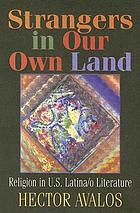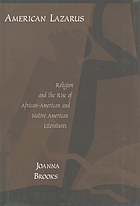
A number of recent books have been devoted to religion and the work of people of color, noting the intersection of Christianity with other faith traditions. Much of this scholarship is dedicated to suggesting the flexibility of religious discourse when it comes to empowerment and resistance. Hector Avalos’s Strangers in Our Own Land: Religion in Contemporary U.S. Latina/o Literature, intended specifically for undergraduates, is an orderly survey of major authors arranged by denominational affiliation or topic. Allen Dwight Callahan’s accessible survey The Talking Book: African Americans and the Bible studies how African Americans have appropriated Biblical texts (focusing on Exodus, Ezekiel, Emmanuel, and Psalm 68) to develop a frequently oppositional, politically loaded Afro-Christianity. One of Callahan’s major themes, the necessity of turning the Bible back against those who used it to justify slavery, also preoccupies Katherine Clay Bassard’s Transforming Scriptures: African-American Women Writers and the Bible, which examines how African American women (mostly of the nineteenth century) appropriated such figures as the Shulamite, Balaam’s mule, and the Queen of Sheba to articulate abolitionist positions, claim the right to preach the Word of God, and critique the mutual imbrication of racial and gender hierarchies.
Joanna Brooks’s American Lazarus: Religion and the Rise of African-American and Native American Literatures insists that the most prominent discursive model for these traditions is not R. W. B. Lewis’s famous “American Adam” but, rather, the figure of Lazarus, who knows death and rises again. Analyzing such figures as Samson Occom, John Marrant, and Prince Hall, Brooks demonstrates that they transformed the rhetorics of Christianity and Freemasonry to insist on the strength of Native American and black communities in the face of ongoing racial oppression. Judylyn S. Ryan’s Spirituality as Ideology in Black Women’s Film and Literature critiques interpretive models that rely on “resistance” and instead argues in favor of “growth,” which emphasizes women’s spiritual and political agency. Drawing on a range of women activists, poets, novelists, and filmmakers, Ryan finds that their spiritual commitments (e.g., the priestess role) joins African and Christian traditions to develop new community-oriented and participatory artistic forms that render the marginalized both visible and powerful. Channette Romero’s Activism and the American Novel: Religion and Resistance in Fiction by Women of Color argues that contemporary African American, Latina, Chicana, and Native American fictions engage critically with the nationalist and separatist tendencies of earlier political moments, using affirmative religious narratives instead to shape a post-identitarian political vision.
 Strangers in our own land: Religion in contemporary U.S. Latina/o literature
by
Strangers in our own land: Religion in contemporary U.S. Latina/o literature
by
 American Lazarus: Religion and the rise of African-American and native American literatures
by
American Lazarus: Religion and the rise of African-American and native American literatures
by